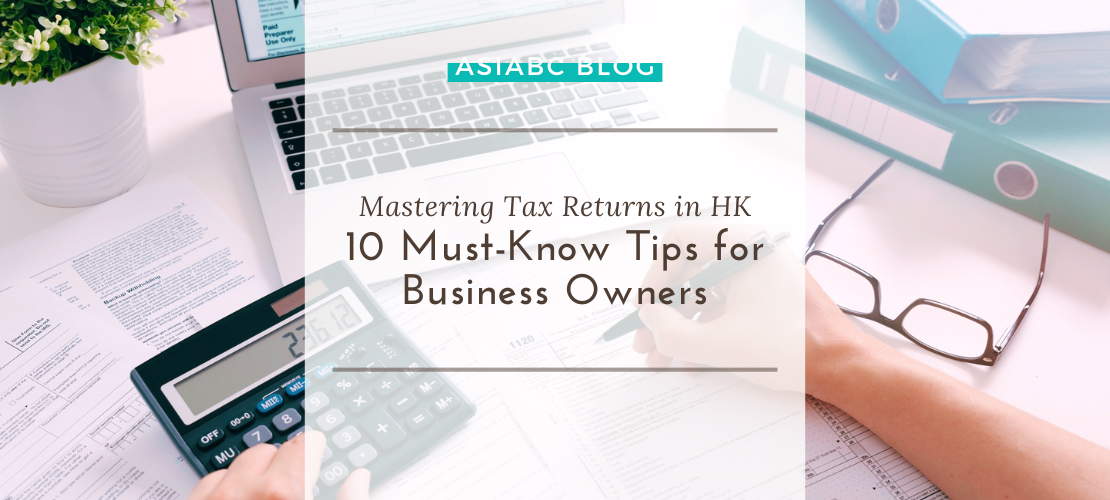Mastering Tax Returns in HK : 10 Must-Know Tips for Business Owners
Contributed by AsiaBC | 02 Feb 2023
Key Filing Tips to Optimise Tax Savings in HK
Taxation is a red-hot concern for company owners in Hong Kong especially as the HK Inland Revenue Department has begun issuing Tax Return letters to taxpayers this April. If you own a Hong Kong company, it is essential to file the necessary tax returns, which include :
Profits Tax Return – Filed on behalf of your registered business as a corporate taxpayer.
Employer’s Return – Submitted for your business’s employment-related taxes.
Salaries Tax Return – Required for reporting your personal income as an individual taxpayer.
Regardless of whether you have already filed these returns, it is beneficial to review the essentials of the Hong Kong tax system and its recent changes to optimise your tax savings with this tax-friendly blog :
- Core Accounting Practices for HK Companies
- Navigating HK’s Tax Landscape
- Seamless Tax Solutions with AsiaBC
Core Accounting Practices for HK Companies
While it is not mandatory for companies in Hong Kong to hire an accountant or tax representative for financial statements and tax returns, they must maintain proper accounting records as mandated by the Companies Ordinance (Section 373). Directors who do not comply with this requirement can face fines of up to $300,000.
Additionally, the Inland Revenue Department requires that the Profit Tax return must be submitted along with a BIR51 Tax Computation and an audit report, which must comply with Hong Kong Financial Reporting Standards and prepared by a certified public accountant.
Navigating HK’s Tax Landscape
Understanding Hong Kong’s tax framework can be complex due to specific rules and recent regulatory changes. This guide covers essential topics, from profits tax due dates to deductible expenses and provisional taxes, helping you optimise your tax strategy and ensure compliance :
01 | Profits Tax Due Date Varies per HK Company
Every company in Hong Kong can choose its own business year-end date for tax purposes. This date determines the basis period for the assessment year, which runs from 1 April to 31 March of the following year.
The Inland Revenue Department (IRD) uses your company’s fiscal year-end date, also known as the accounting date, to establish your tax basis period. This period must cover 12 calendar months. For instance, if your accounting date is 30 June, the basis period would be from 1 July to 30 June of the following year.
Tax returns must be filed within one month of the assessment. The filing due dates the assessment year vary based on your accounting date :
| Accounting Date Period | *Filing Due Date |
| April 1 to November 30 | May 17 (with extension) |
| December 1 to December 31 | August 15 (with extension) |
| January 1 to March 31 | November 15 (with extension) |
*Due dates are fixed regardless of the year.
You can apply to change your accounting date when submitting your second tax return or later, but you will need to provide strong reasons for the IRD to consider your request.
In some cases, the Profits Tax basis period may be less than 12 months, and this is acceptable in situations such as:
- A newly incorporated company filing its first tax return.
- A company using a Lunar Calendar for its accounting date.
- A company changing its accounting date.
- A company ceasing business before or after its accounting date.
02 | Directors’ Fees Are Taxable Under Salaries Tax Rules
Companies operating in Hong Kong must ensure that any fees and benefits paid to a company director are subject to the director’s Salaries Tax, regardless of whether the director is physically present in the region or involved in the company’s management. This also applies to other company officers, such as managers and statutory secretaries, regardless of their residency status.
This regulation helps prevent companies from avoiding Profits Tax by moving profits to pay for salaries, as directors are often the primary beneficiaries of the company’s profits.
There is no need to worry about double taxation on salary expenses, as directors’ fees are deductible from the company’s assessable profits.
With the Profit Tax rate reduced to 8.25% on the first HK$2 million of profit and a HK$20,000 tax deduction available per company, these changes provide significant tax savings for Hong Kong companies.
03 | Shareholder Dividends Are Paid After Profits Tax
Hong Kong companies cannot deduct dividends from their assessable profits, and shareholders do not incur Salaries Tax on the dividends they receive. However, they might be taxed if they are tax residents in other countries, especially if there are capital gains involved, potentially leading to double taxation.
Some countries impose taxes on their residents for income earned outside their jurisdiction, meaning overseas shareholders may be subject to tax on dividends from a Hong Kong company. As a result, most international company owners prefer to withdraw funds through employee’s paycheck instead of dividends, since Hong Kong offers a basic allowance for individual taxpayers, making this a more tax-efficient option.
04 | Provisional Tax Covers All Income Types in HK
Provisional Tax in Hong Kong is an estimate of income expected for the current assessment year and is set at 100% of the tax calculated from the previous year’s profits.
This tax is structured into two payments : 75% is due about nine months into your accounting year, and the remaining 25% is due 12 months later. Meaning, by the time the Provisional Tax is collected, you are expected to have earned the income. Any excess in your final tax assessment is credited toward the next year’s tax.
Additionally, you can request a delay in paying Provisional Tax if your current profits are expected to be less than 90% of the previous year’s profits or if you are ceasing business operations. Think of Provisional Tax as a pre-paid estimate of your tax obligations, helping you manage your payments throughout the year.
05 | Not All Business Income Is Subject to Tax
“Assessable profits” refer to the net profits (or losses) for the tax period, derived from activities in Hong Kong, as calculated under the Inland Revenue Ordinance (IRD). The IRD considers the following types of income as chargeable to Profits Tax :
Chargeable Income
- Rental income. Earnings from sub-letting part of your business premises.
- Trade rebates. Rebates received from business associates.
- Forfeited deposits. Compensation from customers for cancelled contracts or forfeited trade deposits.
- Recovered trade debts. Trade debts previously considered irrecoverable but later recovered.
- Grants and subsidies. Funds received from the government or other entities that are not related to capital expenditures.
- Rental income from equipment. Earnings from renting out computers, equipment, or machinery.
- Intellectual property. Payments for the use of patents, trademarks, or copyrights in Hong Kong.
- Transfer of rights. Sums received for transferring the right to earn income.
Non-Taxable Income
Income arising from daily business operations is generally non-taxable, provided it is not considered revenue by the IRD. Examples include :
- Sale of fixed assets. Proceeds from selling capital assets.
- Sale of business interests. Income from selling business goodwill or interests.
- Lease termination compensation. Payments received for the early termination of business leases.
- Dividends. Amounts from corporations that are subject to Profits Tax separately.
- Included amounts. Sums already counted in the assessable profits of other taxpayers.
- Interest income. Returns from bonds and investment funds.
06 | Not Every Business Expenses Is Deductible
The key factor to determine if an expense is deductible is whether it relates to your day-to-day business operations. The Inland Revenue Department (IRD) provides guidelines for which expenses can be safely reported as deductible :
Deductible Expenses
- Rent. Payments for business premises or employee quarters.
- Utilities. Charges for electricity, water, and telephone services at business locations.
- Salaries and wages. Compensation, allowances, and bonuses for employees.
- MPF contributions. Employer contributions to Mandatory Provident Fund (MPF) schemes are limited to 15% of total employee emoluments.
- Self-employed MPF contributions. Mandatory contributions for sole proprietors or partners, capped at $18,000 per year per person (for the year of assessment 2015/16 and onwards).
- Severance payments. Compensation that is provided upon the termination of employment.
- Interest on loans. Interest on funds borrowed for normal business activities, such as purchasing stock (must meet specific conditions in the Inland Revenue Ordinance).
- Bad debts. Recognized sales for which payment cannot be collected from customers.
- Repair costs. Expenses for repairing articles, premises, machinery, and equipment used to generate profits.
- Charitable donations. Approved donations of at least $100, not exceeding 35% of your assessable profits.
Non-Deductible Expenses
Certain expenses are not deductible according to the IRD :
- Capital losses. Any loss of capital is not deductible.
- Withdrawals. Money taken out of the business.
- Capital expenditures. Costs related to purchasing fixed assets.
- Improvements. Expenses for enhancing assets.
- Unoccupied premises. Rent or expenses for premises not used to generate assessable profits.
- Recoverable sums. Any amount recoverable under insurance or indemnity contracts.
- Taxes. Taxes paid under the Inland Revenue Ordinance (except Salaries Tax for employees).
- Personal expenses. Domestic or private costs, including medical expenses, insurance premiums, and family celebrations.
- Commuting costs. Travel expenses between home and the business location.
- Traffic penalties. Fines incurred during deliveries to customers.
- Non-profitable expenditures. Any amounts not spent to produce assessable profits.
07 | Profits Tax Allowances for Specific Business Nature
Under the Profits Tax regime, the only allowance available to taxpayers is “depreciation allowances,” specifically applicable to manufacturing and construction businesses which includes :
- Industrial building allowances. Designed to the value of structures used for industrial activities.
- Commercial building allowances. Applicable to the value of properties utilised for commercial operations.
- Plant and machinery allowances. Relevant for manufacturing industries, covering equipment and machinery used in production.
08 | Identifying Profit Sources in a Global Marketplace
Under the Inland Revenue Ordinance (IRO), profits tax applies only to profits generated from activities in Hong Kong, regardless of the taxpayer’s residence. To qualify as Hong Kong-sourced income, profits must derive from a trade or business conducted within the region.
It’s recommended to review the IRD’s general tax guide and technical notes for detailed criteria and legal clarifications on territorial source taxation. To support claims of non-Hong Kong sourced income, the entire business operation must take place outside Hong Kong.
09 | Deficits Can Be Beneficial for Tax Savings
The tax loss can be carried forward to offset future profits of your business.
10 | Brace for Enhanced Tax Regulations in HK
Recent regulatory changes have tightened the rules on tax exemptions for offshore income – income earned outside Hong Kong, preventing profit shifting by multinational companies. The IRD requires proof that it has been or will be taxed in other jurisdictions when claiming exemptions. If profits are transferred to Hong Kong companies and reported as Hong Kong profit, they must provide proof of activities conducted in the region.
Qualifications for offshore exemption are as follows :
- Management control. The company must be managed and controlled outside of Hong Kong.
- Company headquarters. The location of the headquarters should be outside Hong Kong, with permanent office and local staff.
- Justification. The company must disclose why the business operates through a Hong Kong company rather than one in the home country or the profit source.
Seamless Tax Solutions with AsiaBC
Mastering Hong Kong’s tax landscape is vital for business success, and hiring professional accountants can provide the expertise needed to thrive. Their skills in managing accounting tasks empower you to make informed decisions while ensuring full legal compliance.
Ready to experience smooth and stress-free accounting? Talk to our specialists via WhatsApp +852 9578 0528 email at business@asiabc.com.hk and let AsiaBC handle all your tax and accounting worries.



![Asia Business Centre (Asia Business Centre (AsiaBC) [HK+SG Bank Account Opening / Company Formation / Company Secretary / Accounting & Tax])](https://asiabc.com.hk/wp-content/uploads/Blog-Thumbnail-Unleash-Your-Offshore-Potential-The-Money-Matrix-of-Singapore-Bank-Accounts-1-80x80.png)
![Asia Business Centre (Asia Business Centre (AsiaBC) [HK+SG Bank Account Opening / Company Formation / Company Secretary / Accounting & Tax])](https://asiabc.com.hk/wp-content/uploads/Blog-Thumbnail-Which-Offshore-Bank-Is-Right-for-You-Singapores-Top-5-Business-Banking-Elites-80x80.png)



